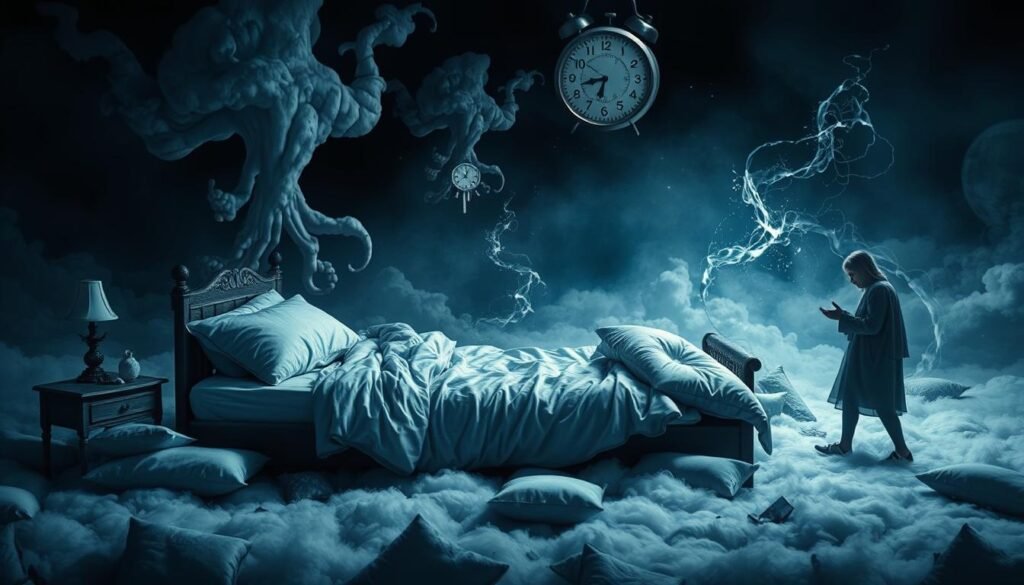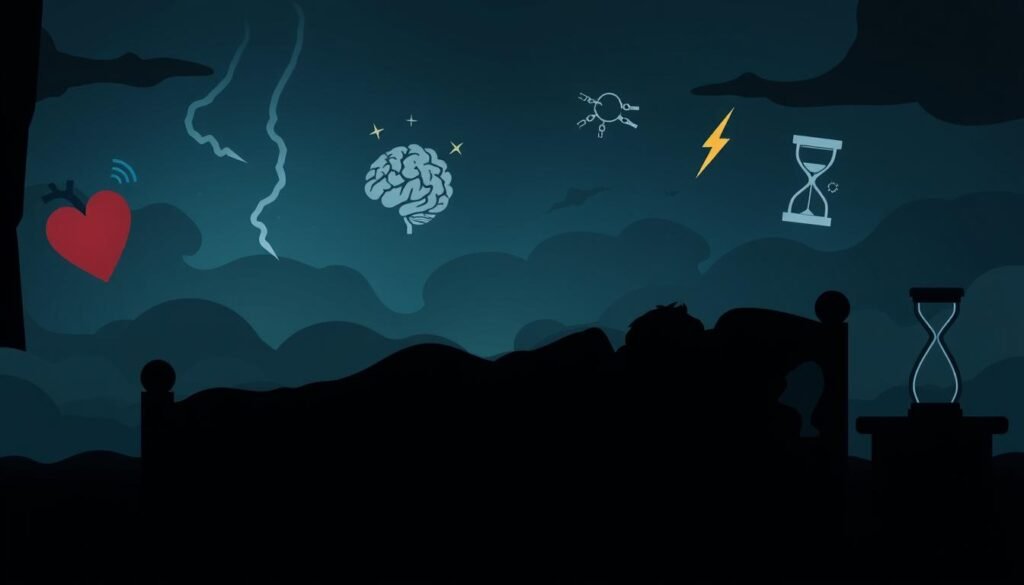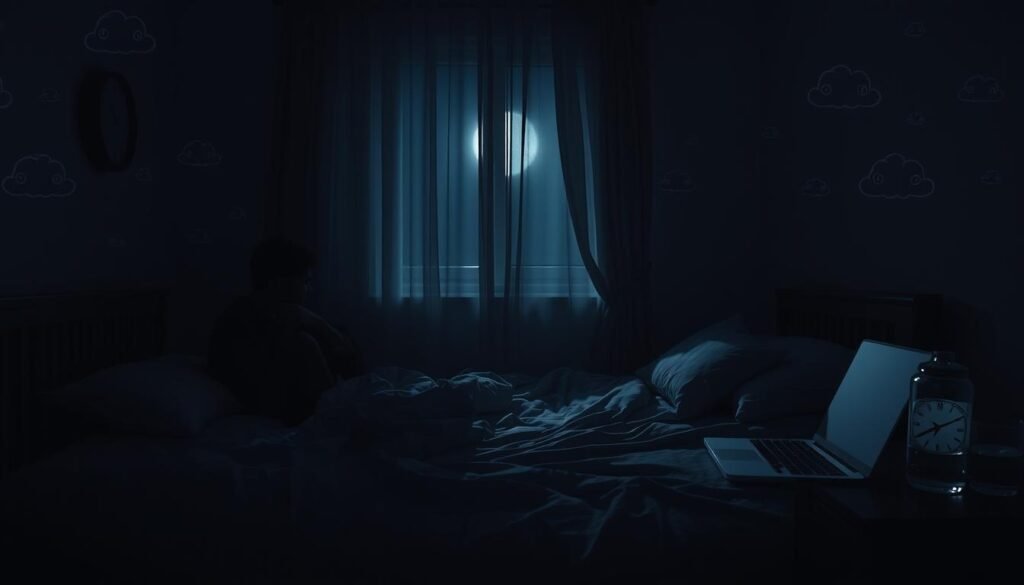Did you know that up to 35% of US adults suffer from insomnia? This sleep problem can make it hard to fall asleep, stay asleep, or cause early wake-ups. It affects many because of its link to physical and mental health, plus daily life.
Getting too little sleep can cause daytime tiredness, changes in mood, and worse work or school performance. That’s why knowing about insomnia’s symptoms and causes is key. It helps anyone looking to sleep better and boost their overall health.
In this article, we discuss the various forms of insomnia, its health impacts, and how to manage sleep better. Our goal is to enlighten readers, helping them find the right support for improved sleep.
Key Takeaways
- Insomnia is the top issue people have with sleep.
- It can cause daytime fatigue, moodiness, depression, and concentration problems.
- Main reasons include stress, mental health problems, and bad sleep routines.
- Insomnia can affect anyone, regardless of age, gender, or lifestyle.
- To manage it, maintain regular sleep routines and, if needed, get professional help.
Understanding Insomnia
Insomnia is a big problem for around 18 million Americans. It messes with how well you sleep. You might find it hard either to fall asleep or to stay asleep.
It seems to bother women more than men. A lot of people just have trouble sleeping now and then. But, when it happens all the time, it’s a bigger issue. About 1 in 3 adults will face short-term insomnia at some point. Things like how you live, stress, and your health play big roles.
Insomnia can lead to really bad outcomes, like more chance of heart disease, stroke, and diabetes. You might gain weight, feel depressed, and get into accidents because you’re tired. It makes life harder, causing symptoms like headaches, stomachaches, and being cranky.
To beat insomnia, it helps to understand what causes it. Stress, your bedroom setting, and bad habits are common culprits. Treatments include therapy, changes in lifestyle, counseling, and sometimes meds. Choosing the right treatment helps fix your sleep and makes life better.
Types of Insomnia
Insomnia comes in two main types: acute and chronic. Acute insomnia is the short-term kind, usually because of stress or a traumatic event. It can last from a few days to a couple of weeks. Once the cause is gone, it often gets better. About 30 percent of people will face acute insomnia yearly.
Chronic insomnia, on the other hand, makes it hard to sleep at least three nights a week for three months or more. It’s usually due to ongoing health problems or stress. This can really affect your day-to-day life. Around 10 percent of people have chronic insomnia. This can cause a lot of issues like feeling very tired during the day and mood changes.
It’s crucial to know the difference between acute and chronic insomnia. This knowledge can help you find the right help. Your age, gender, and lifestyle can all play a role in whether you’ll have insomnia. Being aware of these factors is key for good sleep health.

| Type of Insomnia | Duration | Common Triggers | Impact |
|---|---|---|---|
| Acute Insomnia | 1 to 2 weeks | Stress, trauma, environment | Short-term sleep disturbances |
| Chronic Insomnia | 3 months or more | Underlying health conditions, ongoing stress | Long-term sleep issues, daytime fatigue |
Symptoms and Causes of Insomnia
Insomnia is the top sleep issue for many people. It’s key to know the symptoms of insomnia to manage it well. Having trouble sleeping, waking up often at night, and getting up too early are common signs. People may also feel very sleepy during the day, get easily annoyed, and find focusing hard. Worrying too much about sleep can make these issues worse, making it hard to break the cycle.
Common Symptoms
It’s important to recognize the symptoms of insomnia early. If you’re missing out on sleep, you might:
- Have trouble falling asleep
- Often wake up in the night
- Wake up too early in the morning
- Feel tired or sleepy during the day
- Experience mood swings and get irritated easily
- Feel more anxious than usual
These sleep problems can seriously mess with your daily life. They can hurt your work and how you get along with others.
Recognizing the Impact of Lack of Sleep
Missing enough sleep does more than make you tired. Chronic insomnia can make it hard to do daily tasks well. You might struggle to concentrate or make decisions. You might also feel more stressed out, which can make you upset and harm your health overall.
It’s important to deal with these issues. Changing your sleep habits and lifestyle can help. For more details on symptoms, causes, and treatments, check out this resource. Knowing what makes you at risk, like stress or mental health issues, can help you fight insomnia better.
Health Consequences of Insomnia
Insomnia creates big problems for both the mind and body. It’s been linked with many health issues. This is why understanding its effects is key to public health.
Effects on Mental Health
Insomnia greatly affects mental health. Those with it face a higher risk of anxiety and depression. They’re up to five times more likely to get depressed.
About 40% of people with insomnia also have another mental issue. Depression is the most common one. It makes existing mental problems worse and slows down recovery. Dealing with sleep well is very important.
Physical Health Risks
Insomnia also harms physical health. It raises the risk of chronic diseases like heart trouble and diabetes. Adults sleeping less than five hours face a 2.5 times higher diabetes risk.
It weakens the immune system too. This makes us more open to infections like colds. These issues lower the quality of life and increase health costs.

So, fighting insomnia matters a lot. It protects mental health and prevents many diseases. For more info, visit health risks associated with insomnia.
| Health Consequence | Description | Associated Risk |
|---|---|---|
| Depression | Higher likelihood of developing depressive disorders | 5 times more risk |
| Hypertension | Increased blood pressure | Higher risk of heart attack |
| Diabetes | Greater likelihood of developing diabetes | 2.5 times more risk with |
| Weakened Immune System | Lower resistance to infections | Increased sickness from viruses |
Major Causes of Insomnia
Understanding what causes insomnia is key to dealing with it. Many factors, like stress and certain disorders, disrupt sleep. Knowing these can help people find the right help and solutions.
Stress and Mental Health Disorders
Stress is a big cause of insomnia. Events like changing jobs or losing someone dear can lead to anxiety. This anxiety can make it hard to sleep well. Also, if someone has mental health issues like anxiety or depression, it can make their sleep worse. Studies show that high stress means poor sleep. Conditions like PTSD also make insomnia more common. Finding and treating these mental health problems is important.
Sleep-Related Disorders and Their Impact
Conditions like sleep apnea and restless legs syndrome are also behind insomnia. They break the normal sleep cycle, causing tiredness and lack of energy. Sleep apnea is known for loud snoring and stopping breathing, which ruins good sleep. Those with such disorders struggle to keep a steady sleep routine. This makes insomnia symptoms worse. Dealing with these disorders is a key part of treating insomnia.

Poor Sleep Hygiene and Its Effects
It’s important to know how sleep hygiene and sleep patterns relate. Some habits disrupting sleep can lead to bad sleep quality. Better sleep habits can greatly improve how well you sleep.
Habits that Disrupt Sleep Patterns
Many people do things that make it hard to sleep without realizing it. Some common problems include:
- Not sleeping at the same time every night
- Too much screen use before bed
- Drinking caffeine or smoking in the evening
- Drinking alcohol, which might seem helpful but isn’t
These habits disrupting sleep can cause ongoing sleep issues. A regular sleep schedule and avoiding these actions can help you sleep better.
Creating a Comfortable Sleep Environment
Making a comfortable sleep environment is key for good sleep. You should:
- Choose cozy bedding
- Keep the room at a comfy temperature
- Reduce noise with soundproofing or a white noise machine
- Use curtains to keep the room dark
These changes can make a big difference in sleep quality. Good sleep habits and a nice place to sleep can make falling asleep easier.
Managing Insomnia Effectively
Insomnia treatment requires multiple strategies. Sleep management techniques are crucial for better sleep and handling insomnia. Cognitive Behavioral Therapy for Insomnia (CBT-I) is key. It changes negative sleep thoughts and actions.
Importance of Sleep Management Techniques
CBT-I and other psychological methods change how we view sleep. They help fix bad sleep thoughts and habits. Following these methods improves sleep health for a better rest. Mental health experts offer personalized advice for sleep issues.
Role of Lifestyle Changes
Changing your lifestyle is vital for dealing with insomnia. A healthy diet and regular exercise are important. So is a steady sleep routine, particularly for chronic insomnia sufferers. Avoiding caffeine, alcohol, and nicotine helps, as does a relaxing bedtime routine.
These changes are aimed at better sleep health. For more on behaviors that lead to insomnia, visit this website. Making smart choices and applying various methods can improve sleep significantly.
Seeking Professional Help
If insomnia messes with your daily life or doesn’t get better on its own, getting professional help is key. Talking to a healthcare provider can help figure out any deeper issues causing sleep problems.
When to Consult a Healthcare Provider
Knowing when to get help is crucial for handling insomnia well. You should see a healthcare provider if:
- Insomnia sticks around for over a few weeks.
- Lack of sleep makes you tired during the day or affects your thinking.
- You also feel pain, anxious, or depressed.
- You’re dealing with big stress or life changes, like losing your job or going through something major.
Diagnosis and Possible Treatments
To diagnose insomnia, your doctor might do physical exams and use questionnaires. They could also order blood tests to check for things like thyroid issues. Sometimes, a sleep study at a clinic is needed to watch your brain activity and other bodily functions while you sleep.
CBT, or Cognitive Behavioral Therapy, is often the first treatment tried for insomnia. CBT helps treat sleep issues. It uses methods like:
- Stimulus control therapy.
- Relaxation techniques.
- Sleep restriction.
- Passive wakefulness.
In some cases, doctors may prescribe meds like Lunesta or Ambien for a short time. These can help you fall and stay asleep but might make you feel drowsy during the day. Over-the-counter sleep aids are another option. However, they’re not suggested for long-term use because they could impair your thinking.
Lifestyle changes are also part of improving sleep. Sticking to a regular sleep schedule and staying active can make a big difference. You can also try other treatments like herbal supplements, meditation, or yoga along with the usual approaches.
Conclusion
Understanding insomnia is important for those affected by it. It harms sleep quality and everyday life. It often occurs with other health issues, making it key to understand its symptoms and causes.
Improving sleep involves multiple steps. Good sleep habits, lifestyle changes, and professional advice help. Studies show cognitive-behavioral therapy and medication work well for primary insomnia.
Being informed about insomnia helps people manage their sleep better. By seeking effective treatments and knowing what triggers their insomnia, they can improve their life quality and lessen sleep loss risks.